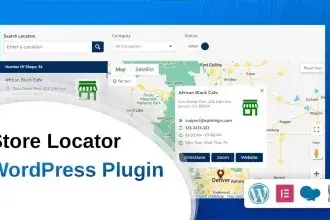If you want to create a WordPress site that offers a great user experience and a high level of functionality, you need a plugin that can help you create custom filters for your content. That’s where FacetWP WordPress Filter Plugin comes in. This plugin is the ultimate solution for creating advanced filters for any post type, taxonomy, or custom field. You can use it with WooCommerce, Elementor, Beaver Builder, and more. It’s easy to use, fast, secure, and reliable. Download it today and see for yourself how it can enhance your WordPress site.
How to use FacetWP WordPress Plugin with WooCommerce
FacetWP WordPress Filter Plugin that allows you to create custom filters for your WooCommerce products. You can use it to enhance your online store and improve your customers’ shopping experience. Here are some steps to use FacetWP WordPress Plugin with WooCommerce:
- Install and activate FacetWP Filter Plugin and WooCommerce on your WordPress site.
- Go to Settings > FacetWP WordPress Filter Plugin and enable the “Support product variations?” setting under the WooCommerce tab. This will allow you to use product attributes as facet sources. Make sure to re-index after enabling this setting.
- Create your facets by clicking the “Add facet” link. You can choose from various facet types, such as checkboxes, sliders, dropdowns, etc. For the facet’s data source, select a choice under the “WooCommerce” header, such as price, rating, stock status, product categories, product tags, or product attributes.
- Add your facet shortcodes to a sidebar text widget or use the FacetWP Elementor widget if you are using Elementor. FacetWP will automatically detect the WooCommerce products query and loop, and display relevant facet choices.
- Optionally, you can also create a sort facet to let your customers sort the products by different criteria, such as price, popularity, rating, etc. You can also create a pager + load more facet to control the pagination of the products.
- Enjoy your WooCommerce store with advanced filters powered by FacetWP WordPress Plugin
For more details and examples, you can check out the official documentation or some tutorials on how to use FacetWP with WooCommerce.
Google Login is required to view download links. Please wait for synchronization."Note: Redownload It After Some Time! When Download Is Not Working Due To Server Busy."
FacetWP WordPress Filter Plugin vs other WordPress filter plugins
FacetWP is a WordPress plugin that allows you to create custom filters for your WordPress content using various facet types, such as checkboxes, sliders, dropdowns, etc. It is compatible with most WordPress themes and plugins, and supports WooCommerce, Elementor, Beaver Builder, and more. It is easy to use, fast, secure, and reliable.
Other WordPress filter plugins are JetSmartFilters, Search&Filter Pro, and Toolset. They also offer different filter types, AJAX loading, compatibility with page builders and WooCommerce, and customization options. However, they have some differences in terms of features, pricing, and user interface.
- Filter types: FacetWP offers 16 filter types, while JetSmartFilters offers 15, Search&Filter Pro offers 12, and Toolset offers 9. FacetWP has some unique filter types, such as proximity, autocomplete, and hierarchy select.
- Pricing: FacetWP WordPress Filter Plugin costs $99 per year for a single site license, $249 per year for a professional license (up to 20 sites), and $599 per year for an agency license (unlimited sites). JetSmartFilters costs $24 per year for a single site license, $49 per year for an unlimited license, and $299 per year for a lifetime unlimited license. Search&Filter Pro costs $20 per year for a single site license, $40 per year for a business license (up to 5 sites), and $75 per year for a developer license (unlimited sites). Toolset costs $69 per year for a presentation license (only views and forms), $149 per year for an interactive license (all features except WooCommerce integration), and $299 per year for an agency license (all features and WooCommerce integration).
- User interface: FacetWP WordPress Filter Plugin has a simple and intuitive user interface, with a drag-and-drop builder, a shortcode generator, and a live preview. JetSmartFilters has a similar user interface, but it also integrates with Elementor and Gutenberg, allowing you to create and edit filters directly from the page builder. Search&Filter Pro has a more complex user interface, with multiple tabs, settings, and options. Toolset has a modular user interface, with separate plugins for different features, such as views, forms, types, etc.
FacetWP Filter Plugin review and tutorial
FacetWP WordPress Filter Plugin that allows you to create custom search and filtering systems for your website. It is easy to use, fast, secure, and reliable. It supports various facet types, such as checkboxes, sliders, dropdowns, etc. It also integrates with WooCommerce, Elementor, Beaver Builder, and more.
If you want to learn more about FacetWP WordPress Filter Plugin, you can check out some of the web search results that I found for you:
- FacetWP: filter your WordPress content by mastering facet art – WPMarmite: This is a comprehensive review and tutorial of FacetWP, covering its features, pricing, pros and cons, and how to set up a blog post filter system with FacetWP.
- FacetWP Plugin Review: Dynamic Filtering for WordPress – WP GPL THEMES: This is another detailed review and tutorial of FacetWP, focusing on its ease of use, performance and speed, customer support, integrations, and comparison with other WordPress filter plugins.
- How to Use FacetWP to Filter Products on a WooCommerce Shop Page – Oxygen: This is a specific tutorial on how to use FacetWP WordPress Filter Plugin with the Oxygen Products List element to filter the products on the Shop page of your WooCommerce site.
- Review of FacetWP and JetSmartFilters Plugins for WordPress (2023): This is a head-to-head comparison of FacetWP and JetSmartFilters, two premium WordPress search and filter plugins, based on their capabilities and ease of use.
Best practices for FacetWP Plugin filter SEO
FacetWP can also create some SEO issues if not implemented properly, such as duplicate content, crawl budget waste, index bloat, and poor user experience. To avoid these issues, you need to follow some best practices for FacetWP filter SEO. Here are some of them:
- Use the FacetWP WordPress Filter Plugin SEO add-on to automatically add noindex and canonical tags to your facet URLs. This will prevent search engines from indexing duplicate or low-value pages and direct them to the main category page instead. You can also use the add-on to customize the title and meta description of your facet pages.
- Use the FacetWP URL add-on to create user-friendly and SEO-friendly URLs for your facet pages. This will improve the readability and relevancy of your URLs and make them more appealing to users and search engines. You can also use the add-on to control the order and format of your facet parameters in the URL.
- Use the FacetWP Caching add-on to speed up the loading time of your facet pages. This will improve the user experience and the performance of your site. The add-on will cache the facet HTML and JSON data and serve them from the database instead of querying the server every time.
- Use the FacetWP WordPress Filter Plugin Indexer add-on to index your facet data in the background and improve the accuracy and speed of your facet queries. This will reduce the load on your server and make your facet pages more responsive and reliable. The add-on will also allow you to index custom fields and taxonomies that are not normally supported by FacetWP.
- Use the FacetWP Analytics add-on to track and analyze the usage and behavior of your facet pages. This will help you understand what your users are looking for and how they interact with your filters. You can also use the add-on to optimize your facet layout and design based on the data.
How to customize FacetWP wordpress plugin for filters
FacetWP WordPress Filter Plugin is a WordPress plugin that allows you to create custom filters for your WordPress content using various facet types, such as checkboxes, sliders, dropdowns, etc. You can customize FacetWP in different ways, such as:
- Choosing the facet type, name, label, and data source for each filter you want to create. You can also adjust the facet settings, such as the layout, the sort order, the count mode, etc.
- Creating a template to display the filtered results. You can use the default template or create your own using HTML and PHP. You can also use the FacetWP shortcode to insert the template anywhere on your site.
- Adding the facet shortcodes to a sidebar widget, a page builder element, or a custom hook. You can also use the FacetWP Elementor widget if you are using Elementor. This will display the filters on the front-end of your site.
- Using the FacetWP WordPress Filter Plugin add-ons to enhance the functionality and appearance of your filters. For example, you can use the SEO add-on to optimize your filter URLs and meta tags, the Caching add-on to speed up the filter loading, the URL add-on to create user-friendly and SEO-friendly URLs, etc.
FacetWP wp plugin short code generator and examples
FacetWP is a WordPress plugin that allows you to create custom filters for your WordPress content using various facet types, such as checkboxes, sliders, dropdowns, etc. You can use shortcodes to display the filters and the filtered results on your site. Here are some examples of how to use FacetWP shortcodes:
- To display a facet, use the shortcode
[facetwp facet="the_facet_name"], wherethe_facet_nameis the name of the facet you created in the FacetWP settings. You can also use PHP code to display a facet, such asecho facetwp_display( 'facet', 'the_facet_name' );. - To display a template, use the shortcode
[facetwp template="the_template_name"], wherethe_template_nameis the name of the template you created in the FacetWP settings. You can also use PHP code to display a template, such asecho facetwp_display( 'template', 'the_template_name' );. - To display a user selections facet, use the shortcode
[facetwp selections="true"]. This will show the active facet choices and allow the user to unselect them. You can also use PHP code to display a user selections facet, such asecho facetwp_display( 'selections' );. - To display a sort facet, use the shortcode
[facetwp sort="true"]. This will let the user sort the results by different criteria, such as relevance, date, title, etc. You can also use PHP code to display a sort facet, such asecho facetwp_display( 'sort' );. - To display a pager + load more facet, use the shortcode
[facetwp pager="true"]. This will control the pagination of the results and allow the user to load more results. You can also use PHP code to display a pager + load more facet, such asecho facetwp_display( 'pager' );.
For more details and examples, you can check out some of the web search results that I found for you:
- Shortcodes Reference | FacetWP: This is a reference guide for all the FacetWP WordPress Filter Plugin shortcodes and their parameters. It also explains how to use shortcodes in different contexts, such as widgets, page builders, and PHP templates.
- How to use custom code? | FacetWP: This is a tutorial for beginners on how to use custom code snippets for FacetWP, such as PHP, JavaScript, CSS, and shortcodes. It also introduces the Custom Hooks add-on, which is a convenient way to add custom PHP code for FacetWP.
- Using FacetWP with the WooCommerce [products] shortcode: This is a specific example of how to use FacetWP WordPress Filter Plugin with the WooCommerce [products] shortcode to filter the products on your WooCommerce site. It shows how to create a facet and a template for the products, and how to use the [facetwp] shortcode to wrap the [products] shortcode.
- Generate WordPress Shortcodes: This is a tool that can help you generate WordPress shortcodes for your custom post types, taxonomies, meta boxes, and fields. You can use this tool to create shortcodes for your custom content and use them with FacetWP.
- Creating Multilingual Filters Using FacetWP and WPML: This is a guide on how to create multilingual filters using FacetWP WordPress Filter Plugin and WPML, a WordPress plugin for multilingual sites. It shows how to translate your facets and templates, and how to use the [wpml_language_selector_widget] shortcode to display a language switcher.








